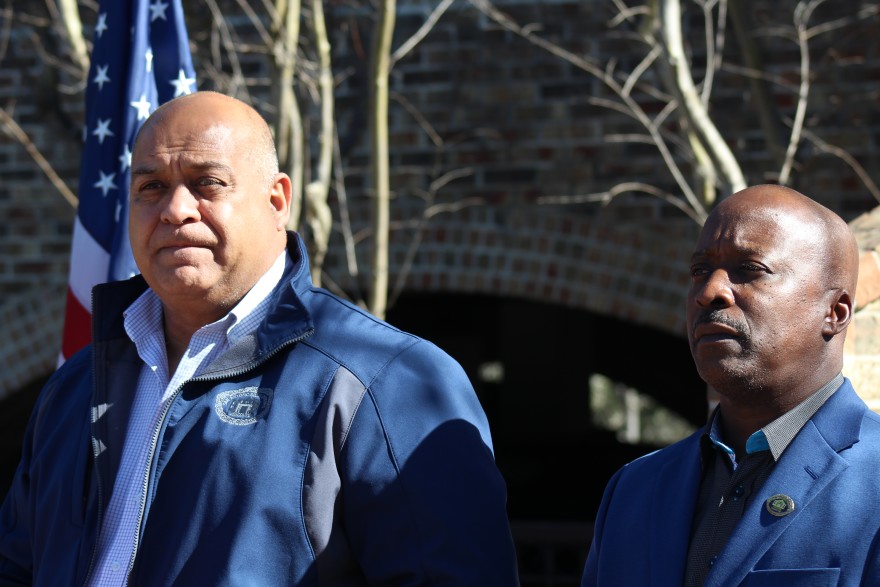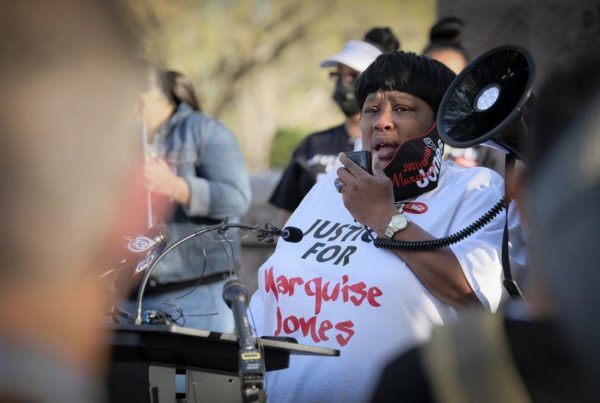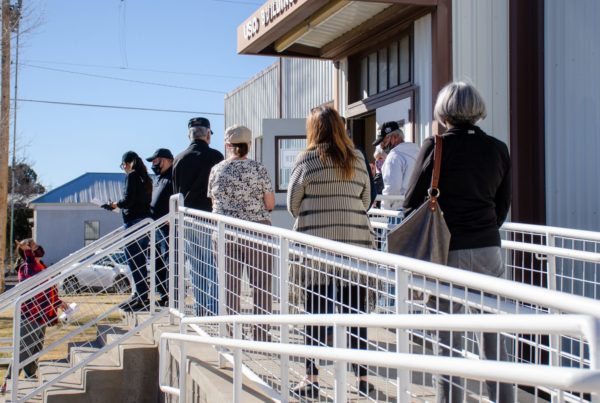As communities across the country react to Derek Chauvin’s guilty verdict in the murder of George Floyd, San Antonio is in the midst of a political fight over police accountability.
On the May 1 municipal election ballot is Proposition B. It would repeal collective bargaining for the police union. Supporters say this would allow the public to have a say in future police contracts. Opponents claim this will make it harder for the department to recruit and maintain officers.
Discipline reform and police accountability are the goals of Proposition B. James Dykman is policy and data analyst for Fix SAPD, an organization that didn’t exist until last summer’s racial reckoning.
“George Floyd and Breonna Taylor — the killing of both of those individuals — really sparked nationwide protests and in San Antonio there was a specific need when it came to this disciplinary process,” Dykman said.
FIX SAPD collected 20,000 signatures in San Antonio to put Prop B on the ballot in order to repeal collective bargaining for the San Antonio Police Officers Association. FIX SAPD wants to change how officers are subject to discipline and firing by giving the power to voters.
”We think that everybody in this city should be able to have a voice on discipline and that discipline is non-negotiable,” Dykman said. “We shouldn’t be having these discussions at the bargaining table in the first place over discipline.”
Collective bargaining is part of a state law known as Chapter 174. San Antonio voters gave the police union collective bargaining rights in 1974. It means the city and union are required to come to the negotiating table.
“In collective bargaining, everyone comes with a Christmas list, right, not everybody gets what they want for Christmas, so all we look for is a fair contract,” said Danny Diaz, the newly elected president of San Antonio’s police union.
The City of San Antonio and the police union negotiate over officer salaries, raises, health care and — this year’s major focus — discipline.
The current five-year contract expires in September, and both sides have met to negotiate about a dozen times since February.
“It’s at a snail’s pace but we’re talking and communicating, right, and that’s where it should be and not… through individuals that seem to think how it should be and think certain things work when it really doesn’t,” Diaz said.
In the police contract, the City of San Antonio wants changes in discipline like eliminating a rule that officer misconduct must be discovered within 180 days from an infraction in order to face punishment; it also wants to alter the arbitration process where police officers can be reinstated by a third party arbitrator if the police chief fires them for misconduct.
An investigation by KSAT-TV found that 66%, or 27 out of 40, fired San Antonio police officers were rehired over the last decade.
Last month, the city detailed examples of fired and rehired officers during a collective bargaining meeting. First Assistant City Attorney Liz Provencio used an undated incident as an example where an unnamed officer was fired for wanting to fight someone in his custody.
“Once the suspect is in the back of the patrol vehicle in handcuffs, he challenges the suspect to a fight, he subsequently unhandcuffs the suspect and challenges him again,” Provencio said. “(The officer) tells him: ‘let’s go,’ ‘let’s do something,’ ‘do something,’ you run’ the suspect did not engage, he was re-handcuffed, placed back in the vehicle, and when asked what the charges were against him, the officer said ‘I’ll think of something.’”
That officer was indefinitely suspended by the chief which is akin to firing. But that suspension was overturned by an arbitrator. According to the city, the officer argued that other officers with similar allegations were only suspended for brief periods of time. There was also a last-chance agreement with the officer. The indefinite suspension was reduced to 45 days.
Other firing cases detailed in the meeting included threats of intimate partner violence made by officers that were also overturned by arbitrators.
In that meeting, Deputy City Manager Maria Villagomez, the city’s lead negotiator, said situations like the ones detailed are why the city has made discipline reform a priority in collective bargaining.
“The misconduct of those officers, who are still working for the San Antonio Police Department is the reason why the community demands change to the discipline process,” Villagomez said.
In response, the police union’s chief negotiator Ron DeLord called the city’s presentation a political stunt and said arbitration is a way to have a clear independent review of the officer’s actions and the chief’s decision.
“If you want a change to where you’re looking for due process and we’re looking to have a fair review of evidence we’ve given you that and we’re open to that dialogue,” DeLord said. “But we’re not interested in having a system that makes the chief infallible. Because only at-will employers can get to make those decisions. This is a union environment with a union contract and with civil service.”
Negotiations can sometimes take months. But union president Danny Diaz said they are making a good faith effort to negotiate.
“We’re doing our part to make sure that not only a contract is in place that’s fair for the citizens of San Antonio, this membership, and the city, we’re not here to break the bank, we’re public servants, what FIX wants is for us to be at-will employees,” Diaz said
As it’s written, Proposition B does not create a requirement or mechanism for defunding or reducing the police budget. However, Diaz believes it’s a method of defunding since there is no obligation to negotiate.
“They’re defunding the pay raises, they’re defunding the insurance, they’re defunding in the way that we can sit and talk with the city about acquiring equipment, it’s defunding,” he said.
James Dykeman of FIX SAPD doesn’t see it that way.
“They’re lying because they know that … the word defund is not popular, and they’re trying to drag Proposition B down using that word,” Dykman said.
The union has accused Fix SAPD of lying during signature gathering in the winter.
If Prop B passes and collective bargaining is repealed a few things can happen. The City of San Antonio, by law, cannot take a stance on Prop B. City Attorney Andy Segovia said even if Prop B passes, the police department will still function.
“As a city, we fully recognize we need to have a very robust and effective police force, right, and that we would have to provide competitive compensation, we would have to provide them, the adequate tools, the training, the tools to do their job effectively,” Segovia said.
There are two other chapters in state law that allow for a different type of negotiation to take place called meet and confer — which is used in Austin, Ft. Worth, Dallas, and Houston.
Police officers will still have Chapter 143, another state law known as civil service. That allows for meet and confer but it also grants protections like the 180-day rule and a right to arbitration — so it won’t immediately solve the city’s goal of altering those discipline procedures.
Fix SAPD wants to repeal Chapter 143, too, by another city vote. It’s still collecting signatures with the hope of getting it on another ballot. However, 143 and another law — Chapter 142 — allow for whatever police contract comes out of a meet-and-confer agreement to be rescinded by the public through petition and a citywide vote.
“Citizens getting a right to vote on the contract, citizens having a stronger hand at the negotiating table, the city having a stronger hand at the negotiating table is better for all San Antonians,” Dykman said.
The police union said however, that move would allow Fix SAPD and other activists to petition and vote against every contract.
“Any contract that we would come to, or any agreement that we would come to with the city, all they would do is keep doing petitions,” Diaz said.
Earlier this week, the city and union extended negotiations by 15 days, taking it past Election Day on May 1. The extension is unrelated to the proposition. The results of the election will determine how negotiations with the union and city move forward.














